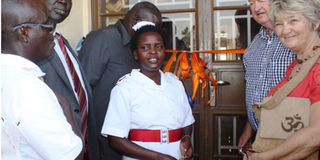She fought for a community health centre

Connie Apio with officials from World Vision and Mountain Blue Farms at the commissioning of Opeta Health Centre III in Aboke sub-county Photo by Albert Tumwine.
What you need to know:
From her own sordid past, she developed a yearning to uplift underprivileged girls.
You can only know the contribution Connie Apio has made to the mothers in her community Opeta parish after she is asked to make a speech on the journey she has walked since she was posted as a midwife there in 2005.
Apio is the in-charge of the newly commissioned Opeta Health Centre III in Kole District that she lobbied for, for over 10 years.
The facility’s status was recently elevated from health centre II after Apio’s persistent lobbying. Her story is that of enduring the hardships of working in a poorly equipped, actually empty hospital.
The struggle begins
In 2005, Apio was posted to Opeta Health Centre II as a midwife. However, like many health centre IIs, there was no maternity ward. How was she then going to deliver mothers with no equipment?
“Because I couldn’t do anything about the equipment like delivery beds and mattresses I had to improvise. There were two long benches at the hospital, and these were to act as a delivery bed. I put them together so they could have a surface area like that of a delivery bed,” Apio says.
The benches however were bare since there was no mattress to lay on them, the patients had to put up with the discomfort for some time as Apio continued to lobby for a bed.
“It has been very challenging, I used to bring two benches together without a mattress for a delivery bed which not only made my work difficult, but also put the life of patients at risk,” she says. “I kept asking the district administration to provide us with a delivery bed, but this came four years later but without mattresses.
We had to use papyrus mats,” she says. She persisted, encouraging mothers to attend antenatal care, for she believed the little was better than making them wait their pregnancy at home.
Tough moments
Due to the rudimentary measures Apio used, complications were bound to happen.
“There is a mother whose baby got stuck between her legs and another who had a postpartum hemorrhage (post-delivery bleeding).
I couldn’t do anything because I didn’t have a drug to counteract the situation. I had to rush both of them (on different occasions) on a boda boda to the regional referral hospital in Lira which is 40kilometres away from Aboke,” she says.
Though both moments were extreme, the lives of the patients were saved at the referral hospital which they reached after almost two hours on the road.
These scares prompted Apio to continue asking the district authorities to provide maternity services at the facility. She would jump on a motorbike to the district headquarters at least once every two months because the number of mothers she handled was steadily growing.
The relief
Due to her constant visits to the district headquarters as she lobbied for the health equipment, Apio was noticed by World Vision officials based in Oyam District. She was desperate for any well-wisher that could offer a shoulder to the suffering mothers in her village.
“I didn’t know what this meeting with the officials would bring to our health facility, but I told the story of the two benches and all that was happening at the health centre I headed and how I had struggled to get the only bed and mattress from the hospital,” Apio says.
“They came to the facility, evaluated and took the health centre’s profile and they promised to revamp the entire health facility. A year later, they brought a plan and in a period of one year the promises are fulfilled,” recounts Apio. Today Apio isn’t jubilating alone, but with the entire community.
The new health facility will now serve the population of about 20,000 people from two parishes, Opeta and Apach. It has the capacity to handle more complex conditions such as full maternity, TB management, minor surgeries and emergency deliveries that could only be handled in the regional.
Apio is now a happy woman after her efforts brought mothers in her village a health facility with modern equipment and facilities. “They have also undertaken to recruit and pay new medical workers to further boost the performance of our health centre,” she says.




